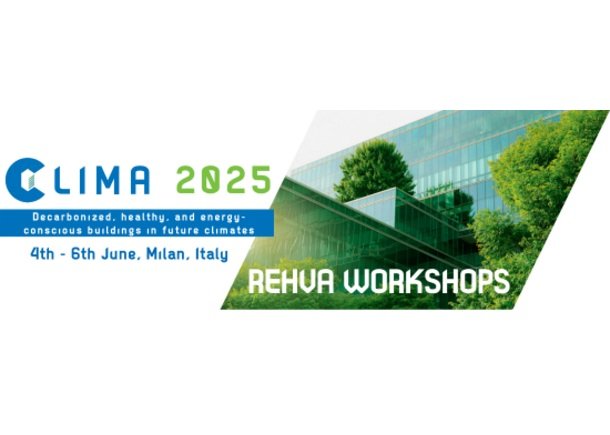REHVA to Host Technical Workshops at CLIMA 2025 on HVAC and Building Performance
REHVA will organize a series of technical workshops at CLIMA 2025, focusing on sustainable HVAC solutions and indoor environmental quality (IEQ). The workshops will bring together experts and researchers from international organizations to discuss current challenges and share knowledge in the field.
One of the sessions, hosted jointly with ISHRAE, will examine indoor climate targets and design requirements in Indian and European educational buildings. The discussion will address poor indoor air quality in schools and its impact on student health and performance. Participants will explore how to balance energy efficiency with thermal comfort and improved air quality.
In collaboration with CAHVAC, another workshop will explore sustainable buildings in Europe and China. Presentations will highlight research on innovative HVAC technologies, energy performance assessments, and case studies that link building design to occupant well-being.
A third workshop, led with SHASE, will introduce a joint position paper on Zero Energy and Zero Emission Buildings (ZEBs). Experts will present energy simulation results from ZEB apartment models in three European climates and share findings from Japanese office buildings. The session will compare HVAC systems in terms of thermal comfort, indoor air quality, and energy use.
REHVA will also host a workshop focusing on the updated 2024 Energy Performance of Buildings Directive (EPBD). The session will cover new IEQ requirements, including national standards and mandatory indoor air quality monitoring in new non-residential buildings. Long-term performance, demand-controlled ventilation systems, and data-driven optimization methods will be key topics.
Several workshops led by EU-funded projects will also be part of the program. The ENERGATE and MODERATE projects will share insights on energy efficiency solutions for real estate stakeholders. This includes addressing high renovation costs, regulatory complexity, and lack of access to financial incentives. The session aims to identify strategies to advance smart building technology and financing models.
The SmartSquare workshop will focus on the Smart Readiness Indicator (SRI) and how the project's outcomes align with EU-level implementation. Case studies will illustrate its potential impact on design consulting and regional adoption.
Lastly, the EPB Center and tunES project will present developments in next-generation Energy Performance Certificates (EPCs) and SRI. The session will feature a panel discussion on practical strategies for EPBD Recast implementation, supported by multiple EU-funded initiatives.
All workshops aim to promote international collaboration and accelerate the adoption of sustainable HVAC practices and policies.
